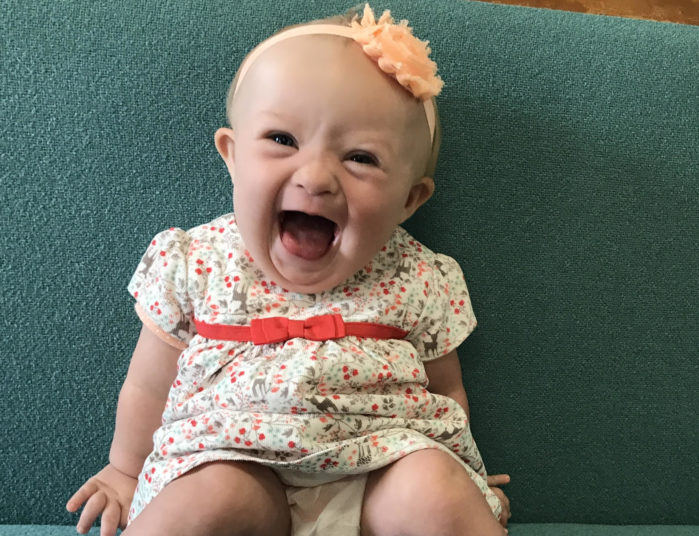Missouri may protect unborn babies with Down syndrome from discriminatory abortion deaths after a judge declined to block the new law Tuesday.
Planned Parenthood and the American Civil Liberties Union challenged the state law, which includes multiple pro-life provisions including a ban on abortions after 8 weeks when an unborn baby’s heartbeat is detectable.
U.S. District Judge Howard Sachs’ order stops the state from enforcing most parts of the law, but he did not include the non-discrimination parts in his preliminary injunction, St. Louis Public Radio reports.
This means that Missouri is one of just a few states that legally can protect unborn babies with Down syndrome from discriminatory abortion deaths. The law also prohibits abortions based on the unborn baby’s sex and race.
Sachs’ decision, though temporary, is good news for the rights of unborn babies and for all people with disabilities.
Republican state Attorney General Eric Schmitt celebrated Sachs’ decision to allow that part of the law to take effect, the AP reports.
“As the father of a child with special needs, Attorney General Schmitt is particularly sensitive to suggestions that an unborn child who will have special needs is any lesser of a human being, and we’re glad that provisions relating to that issue were left in place in the judge’s ruling today,” spokesman Chris Nuelle said in a statement.
However, Colleen McNicholas, an abortionist and chief medical officer for Planned Parenthood of the St. Louis Region, said women should be allowed to abort unborn babies just because they have Down syndrome.
“Although we are grateful today’s ruling allows us to provide care to some Missourians, we will continue to defend the truth: EVERY reason to have an abortion is a valid reason,” McNicholas said.
Click here to sign up for pro-life news alerts from LifeNews.com
Research indicates that unborn babies with Down syndrome are targeted for abortions at astronomical rates. The abortion rate for unborn babies diagnosed with Down syndrome is nearly 100 percent in Iceland, according to CBS News. Estimates put the rate at 77 percent in France and 67 percent in the United States, though some estimate it may be as high as 90 percent.
This eugenic targeting has prompted a number of states to pass laws protecting the unborn. Missouri is not the first, but it is one of the few that has been allowed to enforce its law.
North Dakota became the first state to ban abortions on unborn babies with Down syndrome in 2013. Abortion activists challenged the law, but a judge allowed it to go into effect.
According to the Charlotte Lozier Institute, Louisiana has a similar law in effect.
Utah also passed a non-discrimination pro-life law this year, but it has a clause that only allows the law to go into effect if a court upholds a similar law, the AP reports. It is not clear if the Utah law is in effect because, although the Missouri judge did not block its state law, he did not uphold it either.
Indiana, Kentucky and Ohio also passed non-discrimination laws to protect unborn babies with Down syndrome, but none of them are in effect due to legal challenges from the abortion industry.
The final success of such court challenges remains uncertain. In May, the U.S. Supreme Court refused to hear an appeal urging it to uphold an Indiana law that protects unborn babies with Down syndrome. The decision meant that a lower court ruling blocking the law remains in place.
The justices’ decision left open the possibility of hearing an abortion challenge in the future. But it appears that, at least for now, most of the justices did not want to hear a major abortion case.
Justice Clarence Thomas wrote an opinion urging the court to consider laws that protect unborn babies from eugenics.
“… this law and other laws like it promote a State’s compelling interest in preventing abortion from becoming a tool of modern-day eugenics,” he wrote. “Although the Court declines to wade into these issues today, we cannot avoid them forever. Having created the constitutional right to an abortion, this Court is dutybound to address its scope.”
Thomas said he believes the court needs to “percolate” on the abortion issue more before hearing a major abortion case.
One of the groups supporting the law, the American Center for Law and Justice, urged the high court to hear the case on behalf of 44 families of children with disabilities.
“Indiana’s law protects children like theirs and recognizes that unborn children deserve protection from invidious discrimination,” the legal group wrote in its brief. “Though many of these families ultimately lost their children, these parents do not consider that to have diminished the importance of the children’s lives.”
Calling the Indiana law a ban on eugenic abortions, ACLJ pointed out that many vulnerable parents are pressured into the “irreversible decision” to abort unborn babies with disabilities.
Eight states also prohibit sex-selection abortions, which often target unborn baby girls.








